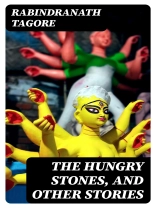In ‘The Hungry Stones, and Other Stories, ‘ Rabindranath Tagore delves into the depths of human emotion and existential reflection through a collection of poignant tales. Written in a lyrical style that blends realism with elements of mysticism, these stories explore themes of desire, loss, and the ephemeral nature of life. Tagore’s masterful use of symbolism and rich imagery invites readers to ponder the complexities of the human soul, often set against the backdrop of India’s cultural and historical landscape. The narrative voice, evocative and contemplative, captures moments of profound beauty and sorrow, offering a nuanced look at the human condition. Rabindranath Tagore, the first non-European Nobel laureate in Literature, was deeply influenced by his upbringing in a family of intellectuals and his exposure to both Western and Eastern philosophies. His experiences, including the socio-political challenges faced by India during colonial rule, informed his writing and his ideals of humanism, art, and freedom. Through these stories, Tagore reflects the turbulence of his times while also transcending it, addressing universal themes that resonate through ages. ‘The Hungry Stones, and Other Stories’ is a recommended read for those who appreciate literature that delves into the spiritual and emotional aspects of life. Tagore’s ability to weave the mundane with the mystical makes this collection not just a journey through narrative but an exploration of one’s own psyche, compelling readers to reflect on their inner worlds.
About the author
Rabindranath Tagore (1861–1941) was a Bengali polymath and a renaissance figure of Indian culture, particularly known for his contributions in literature, music, and art. Born into a prominent family in Calcutta, Tagore began writing poetry at an early age, showcasing his budding talent. He was the first non-European to win the Nobel Prize in Literature in 1913, largely for the English version of his collection of poems ‘Gitanjali’. Besides poetry, Tagore wrote novels, short stories, songs, dance-dramas, and essays on political and social topics. His literary style combined the use of colloquial language with classical forms, bridging the worlds of folk and scholarly traditions. Recognized for his literary versatility, Tagore’s ‘The Hungry Stones, and Other Stories’ features a collection of short stories that explore the themes of love, spirituality, and humanistic values. The stories are notable for their employment of mysticism and fantasy to address the complex interplay of the personal, the historical, and the universal. Tagore’s narratives often revolve around the lives of common people, which he renders with deep empathy and psychological insight. His rich prose and imaginative storytelling continue to influence writers and thinkers worldwide. Considered the bard of Bengal, Tagore’s legacy extends beyond literature; he is also credited with composing the national anthems of both India and Bangladesh. His educational and philosophical ideas led to the founding of Visva-Bharati University, an institution committed to fostering international dialogue and learning. Tagore’s humanism and universal outlook remain as relevant today as during his lifetime.












